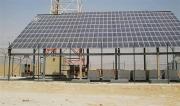|
|
|
|

|
Communications Companies Look to Reduce Environmental Impact
Published Apr 18, 2012
|
Qatar will play host to a key meeting this month, as communications companies look to tackle the problems of climate change driven by high levels of energy consumption and greenhouse emissions.
Leading operators including the Qtel Group, Telesol, Milicom, MTN, Zain and Vodafone, as well as technology leaders including General Electric, Eletek, Ameresco Solar and ictQATAR, are all set to participate in the GSMA Green Power for Mobile Regional Working Group, which is positioned as an “essential meeting for the industry.”
Global warming is a serious problem for the world, and the Intergovernmental Panel on Climate Change (IPCC) has reported that greenhouse gas emissions must be halved no later than by the middle of this century. The communications industry is an increasingly significant contributor to the global consumption of energy, particular as mobile Broadband use places higher power demands on each cell site, and there is greater use of mobile communications and data centres around the world.
Companies in the Qtel Group have looked to play a leading role in this increasingly important area, working to balance the benefits of mobile communication while increasing the responsible use of energy and resources. In Qatar, Qtel was the first company to deploy solar-powered, eco-friendly Base Station sites as early as 2005, while Indosat in Indonesia has deployed more than 100 solar-powered sites to date, and has plans to deploy significantly more in the near term.
A major initiative is also underway to reduce diesel consumption across Qtel Group companies by encouraging the efficient use of an innovative new energy storage solution. More than 1,000 energy efficient sites are on target to be completed by 2012 across the Qtel Group footprint, reducing diesel consumption, including Indosat in Indonesia, Asiacell in Iraq, and Wataniya in Kuwait and Palestine.
Paul Salmon, Chief Technology Officer, Qtel Group, said: “Qtel Group aims to enrich people’s lives, and working to protect the environment plays a major role in the process. We have already made real progress in integrating eco-friendly and high energy efficient technology throughout our regional networks, and we are eager to share our insights with other companies to help make a difference in the developing world.”
“As well as delivering the positive environmental effects of moving away towards efficient energy solutions, the new investment will enable us to reduce expenditure on fuel and power in the medium term, which will contribute to our wider cost optimisation programme,” he added.
The GSMA Development Fund launched the “Green Power for Mobile Programme” in September 2008, in partnership with the International Finance Corporation to promote the development of renewable energies for mobile telecom networks. This project aims to encourage the mobile industry to use renewable energy sources, such as solar, wind or sustainable bio-fuels, to power new and existing off-grid base stations in developing countries.
In a related venture, GSMA has also launched “Community Power from Mobile,” which aims to leverage the scale of mobile technology and infrastructure to provide millions of underserved communities with access to improved energy services. Since the inception of the Community Power from Mobile Programme in November 2010, jointly launched by the GSMA and Lighting Africa, research and analysis has highlighted both the opportunities and challenges in delivering access to energy through mobile.
Over 1.6 billion people lack access to electricity around the world, and in many emerging markets, mobile network operators have become adept at generating their own off-grid power. Based on feedback from mobile operators, it is estimated that one person out of four in Sub-Saharan Africa will not have GSM network coverage in 2012. To reach this population, mobile operators and tower companies are still relying, for the most part, on diesel generators to power telecom towers. Deploying environmentally-friendly towers that can also provide community power offers the opportunity to make an immediate impact.
The two-day workshop, to be held 18-19 April at the Ritz Carlton Doha, is part of a wider on-going strategy to implement attainable green initiatives, in partnership with the GSMA, across all Qtel Group markets. The Working Group is a forum which highlights initiatives and challenges as well as assessing available products and solutions, with the aim of consolidating industry insights and experiences.
About The Qtel Group
The Qtel Group is a leading international communications company, with a significant presence in the MENA region and Southeast Asia, and having a consolidated customer base of 83.4 million as of December 2011. It operates a portfolio of brands including Qtel, Indosat, Asiacell, Wataniya, Nawras, Nedjma and Tunisiana.
The Qtel Group\'s principle activities are mobile telephone services, broadband solutions, digital futures and fibre technologies, serving both consumer and business markets. Headquartered in Doha, Qatar, the Qtel Group is ambitiously growing its global business on the basis of its insights into the needs of customers in emerging markets. Qtel Group\'s ultimate parent company is Qatar Telecom (Qtel) Q.S.C., whose shares are listed on the Qatar Exchange and the Abu Dhabi Securities Exchange.
Posted by
VMD - [Virtual Marketing Department]
|
|
|

